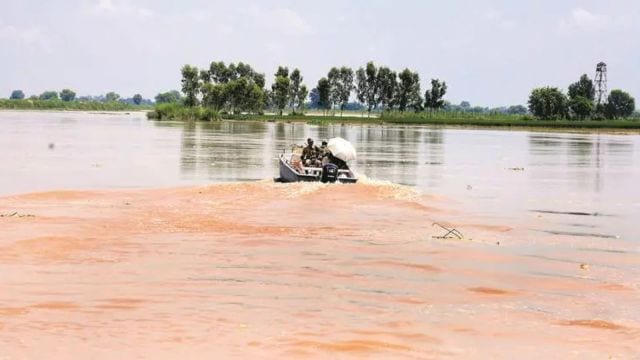‘The water is making us sick’: 1,000 Rajasthan farmers head to Ludhiana to protest Sutlej pollution, most stopped en route
Farmers have been calling for the blocking of ‘Buddha Nala’, a highly polluted stream in Punjab that merges with the Sutlej. The farmers say this stream is the biggest source of pollution in the waters supplied to their districts.
 The farmers, from Rajasthan’s Sri Ganganagar and Hanumangarh districts, have started a ‘Zeher se mukti andolan’ (Stop the pollution movement), alleging that pollution from factories in Punjab is leaving the water toxic and causing major illnesses to residents of their districts. (File Image)
The farmers, from Rajasthan’s Sri Ganganagar and Hanumangarh districts, have started a ‘Zeher se mukti andolan’ (Stop the pollution movement), alleging that pollution from factories in Punjab is leaving the water toxic and causing major illnesses to residents of their districts. (File Image)
More than 1,000 farmers from Rajasthan set out on a protest yatra towards Ludhiana on Tuesday to raise the issue of pollution in the river Sutlej. Water from the river is supplied to 12 districts in the state through the Indira Gandhi canal for drinking and irrigation.
The farmers, from Rajasthan’s Sri Ganganagar and Hanumangarh districts, have started a ‘Zeher se mukti andolan’ (Stop the pollution movement), alleging that pollution from factories in Punjab is leaving the water toxic and causing major illnesses to residents of their districts.
Farmers have been calling for the blocking of ‘Buddha Nala’, a highly polluted stream in Punjab that merges with the Sutlej. The farmers say this stream is the biggest source of pollution in the waters supplied to their districts.
On Tuesday, the Rajasthan farmers set out in 40 buses and 20 private vehicles towards Ludhiana. Ranjeet Singh Raju, farmer leader and state president of Gramin Kisan Mazdoor Samiti (GKS), was among them.
“There was police barricading every 30 km in Punjab. Most of the buses were stopped before Ludhiana, and police barricaded every main road. They did not allow the vehicles from Rajasthan to go inside Ludhiana city,” Raju said.
He was able to reach the protest site in Ludhiana, he said, because he was travelling in a private car. “There were around 200 people gathered in front of the Pollution Control Board office, but the majority of protesters were stopped,” said Singh.
Speaking on the issue they were raising, Rawinder Singh, another protester, said, “The water of Buddha Nala is polluted by chemical, cloth, and leather factories in Punjab. The Punjab government has opened an STP (sewage treatment plant) plant to treat the polluted water, but we have not seen much of an impact from this. The polluted water is supplied to various districts in Rajasthan, which has caused illnesses such as cancer, TB, and various ailments of the lungs. However, the government has been neglecting this issue.”
There was a protest regarding the issue in October last year, too, when markets in Sri Ganganagar and Hanumangarh, including the farmers’ markets, were shut down.
Punjab Pollution Control Board chairman Adarsh Pal told The Indian Express: “I do not know about the (farmers’) protest, but there have been complaints that we received about the pollution in the water. We are taking steps, and many effluent water treatment plants (ETP) are working properly in the region to treat the polluted water coming from the factories. There is, however, around 50 MLD (megalitres per day) or more of water that is going untreated, for which a plan of action is being prepared.”
He also said many dairy industries near Ludhiana are dumping cow dung in the river, which is adding to the pollution. Pal said the local administration is working to set up a proper system to use the cow dung instead of dumping it in the water.












